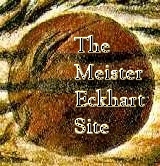|
|
||
 |
Meister Eckhart Home / Works by Meister Eckhart - Quotes / Inspired by Eckhart / Studies / The Papal Condemnation / Mail & Announcements / Links / Books |
AMY HOLLYWOOD
From: M. Rubin, W. Simons (ed.), The Cambridge History of Christianity, v. 4, Christianity in Western Europe, c. 1100 - c. 1500, Cambridge 2009 (Pages 297-307).
Page 3
Augustine and Monica know that they no longer touch Wisdom when they return 'to the sound of [their] own speech, in which each word has a beginning and an ending'. Human speech, unlike the divine Word, occupies time, in which things have a beginning and an ending. The divine Word, on the other hand, is eternal and 'abides inhimself for ever, yet never grows old'. The limitations of human speech to encompass divine Wisdom are further marked by the proliferation of metaphors – from the realms of sight, taste, touch, hearing and thought – with which Augustine attempts to articulate his and Monica's striving after and brief attainment of the divine. Finally, Augustine's experience is resolutely communal; he comes to the Word in and through his conversation with Monica. Together they 'reach out and touch' divine Wisdom and together they fall back into human speech and the 'region of unlikeness' in which creatures dwell until that time when they will come to eternal life in God.
Read in this way, Augustine provides a broadly phenomenological account of Christian mystical experience as it is articulated from the fifth to the sixteenth centuries (and in some cases, far beyond). More accurately, perhaps, his descriptions – in the Confessions and elsewhere – of the transcendence, transience, ineffability, and communal nature of mystical experience provide the parameters within which medieval Christians understand experiences of God and of union with God. Medieval Christian mysticism can be understood as a series of on going experiential, communal, and textual commentaries on and debates about the possibilities and limitations Augustine sets for the earthly encounter between God and humanity.